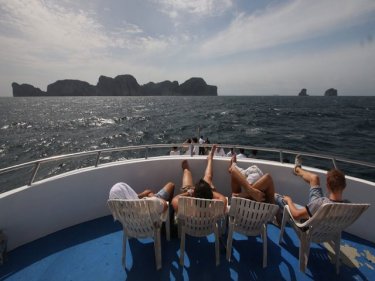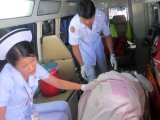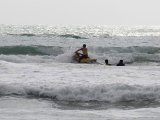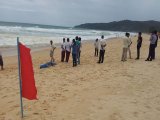PHUKET: Two wonderful tropical holiday islands, two intense turn-offs for tourism. That's Phuket and Phi Phi today in the wake of mystery deaths on one island and a series of needless tourist drownings on the other.
The authorities on both Phi Phi and Phuket have a good idea what the problems are. Local councils do care, but mostly when it suits them. Local authorities are reactive, not proactive.
It's time for a change, for the sake of Thailand's tourism industry - and for the sake of saving lives.
In the 21st century, where news travels everywhere instantly, there are two approaches that can be taken to these kinds of issues.
The first: ignore the problem, pretend it doesn't exist, and hope it goes away.
The second: accept that there's a problem, investigate it thoroughly, and if necessary get help to solve it.
The world's media is more intensely focussing right now on the mysterious deaths of two young Canadian sisters, Audrey and Noemi Belanger, on Phi Phi.
But a lot more attention is also going to be paid to the six drownings of tourists at Phuket beaches in the space of just a month and a day.
On Phi Phi and Phuket, the warning signs have been there that these deadly issues will occur again and again unless authorities react in an appropriate manner.
On Phi Phi, the still-unsolved deaths of American Jill St Onge, 27, and Norwegian Julie Bergheim, 22, in 2009 were followed last year by five more mysterious deaths in Chiang Mai, including New Zealander Sarah Carter, 23.
Thailand's tourism officials eventually realised how damaging the deaths could be for Chiang Mai tourism and had them fully investigated, despite efforts by some locals in Chiang Mai to simply cover up the deaths in hope the tourists would came back.
Thailand today should throw everything it has in the way of experts in toxicology and epidemiology into finding the causes of death of the two young Canadians, found dead in their resort room last Friday.
Even the 20-somethings who have made Phi Phi a must-see island destination and constitute the world's most adventurous travellers are likely to be turned off by Thailand if these latest mysterious deaths are not solved.
On Phuket, the continuing serial deaths of tourists in ''rips'' during the monsoon season highlights the lack of coordination and will in seeking solutions.
Today the body of the latest drowning victim, a Western man plucked too late from the surf at Nai Harn beach yesterday, lies in Vachira Phuket Hospital, unidentified . . . and another mystery.
Everything the authorities have done so far is half-hearted. Some beach councils have posted warning signs. Others have not. Some Phuket resorts warn guests about the dangers of drowning at this time of year. Others do not.
To entice tourists from around the world to Phuket as a ''year round beach holiday destination'' without warning them of the dangers is bordering on criminal.
Phuket authorities, faced with six drownings in the space of a month and a day, must now get serious about finding a solution - or face a gigantic tourism turn-off that will see monsoon season occupancy rates plummet.
Where is the crisis meeting, aimed at seeking solutions? Where are the telephone calls from embassies, outraged at these unnecessary deaths? Where are the leaders of tourism organisations, calling for improvements immediately?
As tourists old and young travel, the two things that they value above all else are security and safety.
The past week's events on Phi Phi and the past month on the beaches of Phuket have proved that more must be done on both tropical holiday islands.

















In the 21st century, where news travels everywhere instantly, there are two approaches that can be taken to these kinds of issues.
The first: ignore the problem, pretend it doesn't exist, and hope it goes away.
The second: accept that there's a problem, investigate it thoroughly, and if necessary get help to solve it.
Very good point..Lets hope they step up and do the latter.
Posted by sky on June 20, 2012 10:57